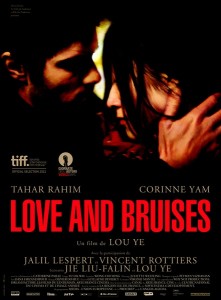Love and Bruises
花
France/China/Hong Kong, 2011, colour, 1.85:1, 103 mins.
Director: Lou Ye 娄烨.
Rating: 7/10.
A raw, hypnotic slice of French amour fou shot by a Mainland Chinese director in Paris.
Paris, the present day. Wandering the streets in a daze after being dumped by her French boyfriend Thierry (Patrick Mille) whom she got to know in China, Hua (Ren Jie), a 28-year-old student from Beijing, literally bumps into Mathieu (Tahar Rahim), 25, a construction worker. He helps her find a bank, and charms her into having dinner together; afterwards, he has rough sex with her in the street and the two then go to a hotel, where they make love till dawn. Hua moves out of the small flat of a Chinese friend (Shao Sifan) and into her own place, and meets Mathieu regularly for sex. She also gets to know his friends Eric (Vincent Rottiers) and Giovanni (Jalil Lespert), whom he sometimes helps out stealing and re-selling antiques. When Giovanni rapes her one day, Hua, suspecting she was set up by Mathieu, decides to break up with him; but when Mathieu threatens to commit suicide, she relents, and later visits him at his home in the suburbs. Mathieu, however, has a secret he hasn’t told Hua – which further strains their relationship. Though she is hopelessly in love with Mathieu, Hua has to decide whether to stay with him in Paris or go back to her former life in Beijing.
REVIEW
After two films (Summer Palace 颐和园, 2006; Spring Fever 春风沉醉的夜晚, 2009) that seemed to consciously court the French arthouse market, as well as western sensibilities in general, Mainland director Lou Ye 娄烨 goes the whole hog with Love and Bruises 花, a typically Gallic tale of amour fou largely set, shot and funded in France. Like South Korean writer-director Hong Sang-su 홍상수 | 洪常秀, Lou seems utterly at home there as a film-maker, even though his movies find grit and realism where Hong’s found wit and manners. One of the major pluses of Love and Bruises is that the drama doesn’t rely at all on the main character, Hua, being Chinese – she could be a foreign student from anywhere – and as a result the film could equally well have been made by a French director, given its complete lack of any “Chinese” signature.
Perhaps because of this, and its setting in the West, the film has none of the dramatic archness and deliberate grandstanding that made Summer Palace and Spring Fever such turn-offs. Though it’s hardly original in its content, and is likely to annoy as many people as its pleases, Love and Bruises is Lou’s best movie since Suzhou River 苏州河 (1999), with which, strangely, it shares some vestigial similarities in its story of obsessive love games.
The film is based on a semi-autobiographical novel, 裸 (literally, “Naked”), by Beijing film researcher-teacher Jie Liu-Falin (aka Liu Jie 刘捷) that was first written in Paris in 2002, then rewritten as a script three years later, and then rewritten by her and Lou in 2007. Some 90% of the movie’s dialogue is actually in French and the cultural identity of the main characters – one Chinese, the other French of North African descent – never becomes a component of the plot. From its in-your-face opening of a street argument between two former lovers, to the visceral physical attraction between Hua and the blue-collar Mathieu, the film is pure metaphysical cinema. The audience is told little about their backgrounds (except in passing references), and the two characters’ emotional journey is neither extensive nor original, and entirely defined by sexual chemistry. But the film does capture the rawness, the headlong plunge into the abyss, of an amour fou that’s seemingly doomed from the start.
Working for the first time with Jia Zhangke’s 贾樟柯 regular d.p., Yu Liwei 余力为, and – equally importantly – an experienced editor, Juliette Welfling (Un prophète, 2009), Lou creates a sense of perpetual emotional instability with hand-held, naturally-lit camerawork, tight editing and his regular composer Peyman Yazdanian’s doleful score. Though there’s some forceful playing by supporting actors Jalil Laspert and Vincent Rottiers as two of Mathieu’s unsalubrious friends, the movie is carried by its two leads, whose screen chemistry is just right to make the sado-masochistic relationship seem believable in movie terms.
As the almost child-like Mathieu, Franco-Algerian actor Tahar Rahim (Un prophète) shows a canny mixture of charm and aggressiveness that’s mirrored in reverse by model-actress Ren Jie 任洁 [Corinne Yam], 30. Born to Hong Kong parents but raised in France, Ren, whose few lines of Mandarin are voiced by a native speaker, is convincing as the dour, somewhat masochistic but equally sex-obsessed Beijinger – to the extent that, even though Mathieu is portrayed as a sleazebag, the story comes over as a true tale of obsessive love rather than an abusive one-way relationship.
The copious sex scenes are staged and shot with Lou’s customary sense of realism but always above-the-waist, and lose nothing by it.
CREDITS
Presented by Dream Factory (CN), Les Films du Lendemain (FR), Why Not Productions (FR). Produced by Why Not Productions (FR), Dream Factory (CN), Les Films du Lendemain (FR), Arte France Cinema (FR), Chinese Shadows (HK).
Script: Jie Liu-Falin, Lou Ye. Novel: Jie Liu-Falin. Photography: Yu Liwei. Editing: Juliette Welfling. Music: Peyman Yazdanian. Art direction: Guillaume Deviercy. Costume design: Virginie Montel. Sound: Dana Farzanehpour, Olivier Do Huu.
Cast: Corinne Yam (Hua), Tahar Rahim (Mathieu), Jalil Lespert (Giovanni), Vincent Rottiers (Eric), Shao Sifan (Liang Bin), Zhang Songwen (Ding Yi), Patrick Mille (Thierry), Adèle Ado (Nina, Mathieu’s Rwandan wife), Minamoto Rika (Isako), Cyril Dubreuil, Elise Otzenberger (Hua’s dinner friends), Magou (musician), Cui Weiping, Zhao Ningyu .
Premiere: Venice Film Festival (Venice Days), 31 Aug 2011.
Release: France, 2 Nov 2011; China. tba; Hong Kong, tba.
(Review originally published on Film Business Asia, 6 Sep 2011.)
